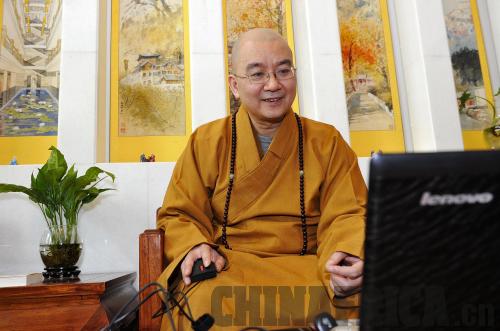|
 |
|
HI-TECH TEACHINGS: Venerable Master Xuecheng is taking Buddhism into the virtual world SHI GANG |
Venerable Master Xuecheng is well known as a Buddhist leader, both inside and outside China. He is the abbot of three temples, vice president of the Buddhist Association of China, and vice president of the Buddhist Academy of China.
However, in spite of his many titles and teachings, Master Xuecheng's fame is rooted in technology. On the Internet he is a prolific blogger, with legions of online followers.
Exploding popularity
As early as February 2006, Master Xuecheng established his personal blog. He became the first eminent Chinese monk to establish a blog and spread Buddhism online in the Chinese Buddhist circles.
On April 11, 2009, his micro-blog accounts in sina.com.cn and qq.com were set up, with the hope of spreading the wisdom of Buddhism in the vast Internet community. On February 17, 2011, his micro-blogs went multi-lingual.
When Master Xuecheng posts in Chinese, more than 170 translators from all over the world translate his messages into English, French, Russian, Spanish, German, Japanese, and Korean.
"Rapidly developing media technology has turned the world into a global village. Human beings are living in a community where their destinies are inter-connected. The peaceful coexistence of different civilizations has become an irreversible trend," said Master Xuecheng.
It is significant for different civilizations to resolve conflicts, build friendship and join hands in development, said the Master.
So far, the Buddhist celebrity's micro-blog is followed by people from more than 100 countries. Over 200,000 fans follow his Chinese micro-blogs (weibo.com/xuecheng, and t.qq.com/xuechengfashi), rivaling the popularity of some movie stars. He also has Facebook and Twitter accounts and is a registered user on micro-blog websites in several countries, including Canada, Japan, South Korea and Russia.
When asked why he decided to establish a micro-blog, Master Xuecheng said it was quite accidental. "A friend established a micro-blog account for me. It would have been disrespectful to decline."
But he didn't pay much attention until the micro-blog achieved unexpected influence. This aroused his interest in the Internet.
He found the Internet could connect Buddhism and society, narrow down the distance between people and quickly spread the Buddhist wisdom of benevolence, equality and harmony.
"Although a monk doesn't need the Internet during personal meditation, the Internet is very significant in spreading Buddhism and bringing benefits to all human beings," said Master Xuecheng. "Nowadays, it is not realistic for Buddhist followers, the general public and foreign friends to go to the temple for Buddhist lectures every day. However, they do use computers every day."
"Buddhism should keep up with the times and embrace modern technology to promote Buddha's teachings in an innovative and recipient-friendly way."
In 1982, then 16-year-old Xuecheng had his head shaved and became a monk in the Guanghua Temple in Putian, southeast China's Fujian Province. Since then he has dedicated his entire life to Buddhism.
In 1989, he became the youngest abbot in China with a master's degree. Later in 2004, he was chosen as the abbot of the Famen Temple, a world-famous temple in Fufeng, Shaanxi Province, where the finger bone relic of the Sakyamuni Buddha is enshrined.
Then in 2005, he became the abbot of the 1,000-year-old Longquan Monastery, located at the foot of Fenghuangling, a picturesque mountain on the outskirts of Beijing.
|